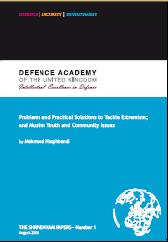1 Tackling Extremism
The author of this site contributes in various ways to the debate over extremism among Muslims. He comes from the unusual position of combining access to authoritative Islamic knowledge, practical experience of tackling such problems in the Muslim community, wide knowledge of local Muslim communities around the UK, and professional involvement in the criminal justice system.Material for the site is generated through voluntary efforts as time permits. Please return to the site at regular intervals for updates. If there is anything particular you would like to pursue, please use the comments facility to contact the author.
Mainstream Muslim Sectarianism Unwittingly Cultivates Extremism
In this iconoclastic paper the author describes how the failure of mainstream Muslim mosques and organisations to meet the needs of converts and young Muslims returning to the faith, lead these neophytes to seek alternatives. Although most alternatives and mainstream bodies themselves are wholesome, sectarian rivalries between those competing for the attention of neophytes then create an environment where individuals inclined to militant rhetoric inflate their claims to attract an enthusiastic newcomer.Even though such claims are often transparently nothing but empty bravado, some among those involved, perhaps the newcomer himself, perhaps a normally less militant rival, perhaps some of the 'armchair' militants, are motivated to 'prove' their dedication by moving on from rhetoric to dangerous action.
In the current environment, ordinary Muslims have been frightened into remaining silent about militancy; and mosques are tightly managed by mainstream factions whose only security measure by which they keep control of the mosque is to prevent rival peaceful factions, along with possible militants, from taking any part in the events or running of the mosque. Consequently all the important conversations with the newcomer, convert or returnee, take place out of the limelight in discreet whispered conversations or in private meetings away from the mosque, where no one can interfere.
Problems and Practical Solutions to Tackle Extremism
Following the bombings of 7th July 2005, he submitted a report privately to the Home Office, and this was published by Advanced Research and Assessment Group (ARAG) of the Defence Academy of the UK in August 2006.This report can be downloaded here as a PDF file. (1.85MB - click once and wait for it to arrive.)
"In this short, incisive, and closely argued paper, the author has opened the way for a wider discussion of an issue of real importance to our national security. He identifies the key issues that he believes affect all Muslim communities in the UK to day. In doing so, he succeeds in demonstrating the great theological and ethnic diversity of these communities – something that is not widely recognised or understood. Furthermore, this is not merely an analysis. The author presents us with an an assessment of the situation and puts forward recommendations as a basis for opening a discussion on how to tackle the problem effectively." Chris Donnelly, Senior Fellow, Defence Academy of the UK, Head of the Advanced Research and Assessment Group
"An important contribution [...] on the subject of tackling extremism among Muslim youth" Lieutenant General Sir John Kiszely, Director, Defence Academy of the UK
The "Problems and Practical Solutions" paper is a summary of discussions of a range of issues that are being devloped through various forums. Other briefings on subjects such as 'radical' groupings, the status of imams, questions of identity and loyalty etc. will be added here as they become available.

